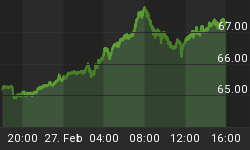Investors are pushing the US dollar down and commodities up as a consequence of the Federal Reserve's strategy of printing money and levering its balance sheet.
Currencies
Australian Dollar (NYSE: USO)
Euro (NYSE: FXE)
Commodities
Oil (NYSE: USO)
Agriculture (NYSE: DBA)
The negative side-effects on the US economy that result from monetary inflation are well-known by economists - primarily, an increase in the cost of living and rising interest rates. However, a less obvious side-effect of Dollar printing is that Americans are able to accumulate commodities and foreign assets at the expense of countries with undervalued currencies such as in Asia, specifically China.
For years the Chinese have been working for Americans in factories and on farms in exchange for Dollars and Treasuries. Now that the Fed is diluting the Dollar, it is arguable that the Chinese have been exploited. However, since the US is struggling to repay its debts, as a creditor, the Chinese should be accumulating US assets at discount prices. Currency pegs, though, are encouraging the opposite effect to take place. Whereas the Dollar's purchasing power should be in freefall, fixed exchange rates are incentivizing US investors to go on a buying spree abroad, which is why commodities are rising and foreign equities (especially Asian property stocks) are increasing faster than US equities. In an ironic twist, the United States is bidding up and acquiring its creditors' assets rather than having to answer to its creditors.
The printing of new money usually allows first movers to get wealthy at the expense of others. While a small number of financiers get wealthy, the whole country gets poorer relative to the rest of the world. Typically this scenario only happens within the country that devalues its currency. Yet in today's current situation, currency pegs are allowing the first movers in the US to acquire global assets with a virtually worthless piece of paper. If this artificial currency regime persists indefinitely, hyperinflation will take hold of the entire global economy. With the possibility of such an adverse outcome for society, foreign governments eventually will realize that the US is once again stealing from everyone - before it was labor, now it is equities and assets. When the world decides that enough is enough, currency pegs at today's levels will be a distant memory. As a result, foreign stocks and commodities, which are extremely cheap today, will no longer be for sale in US Dollars.















